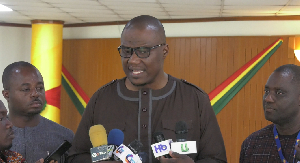 Ranking Member of the Health Committee of Parliament, Dr. Nana Ayew Afriye
Ranking Member of the Health Committee of Parliament, Dr. Nana Ayew Afriye
The Ranking Member of the Health Committee of Parliament, Dr. Nana Ayew Afriye has called on the John Mahama government to apologise for its unfulfilled promise to repeal the COVID Levy and consider redirecting the levy to finance the newly passed Ghana Medical Trust Fund Bill, 2025, popularly known as the MahamaCares Programme.
Speaking on behalf of the Minority at a press conference on Wednesday, July 23, 2025, Dr. Afriye raised concerns about the bill’s financing model and its potential to undermine the National Health Insurance Authority (NHIA), urging the government to provide clarity and adopt sustainable funding options.
The Ghana Medical Trust Fund Bill, passed by Parliament on Tuesday, July 22, 2025, under a certificate of urgency, aims to establish a fund to support specialized medical care for chronic and life-threatening conditions such as cancer, stroke, kidney failure, and diabetes.
However, the Minority strongly opposes Clause 3A of the bill, which allocates 20% of NHIA funds to the Trust, arguing that this could weaken the NHIA’s ability to provide primary healthcare to Ghanaians.
“We strongly oppose the 20% allocation from the NHIA to the Trust,” Dr. Afriye stated, describing the funding model as unsustainable and detrimental to the NHIA’s operations.
Instead, he proposed that the government retain the COVID Levy, which the ruling National Democratic Congress (NDC) had pledged to repeal before the 2024 elections.
“It is not unreasonable for the government to acknowledge changing circumstances and retain the levy to support the Trust’s work,” he said.
“There’s nothing wrong with the government admitting it made a promise at a different time and, given the current situation, making a case to keep the levy to improve the health of Ghanaians,” he added.
Dr. Afriye emphasized that redirecting the COVID Levy would provide a more sustainable financing option for the Trust, ensuring it does not compete with or weaken the NHIA.
“This is not about politics or ego—it’s about improving healthcare for Ghanaians,” he stated.
Beyond financing, the Minority raised concerns about the lack of clarity in the Trust’s operations, particularly its potential overlap with NHIA services. Dr. Afriye questioned at what point NHIA care for non-communicable diseases (NCDs) would end and Trust care would begin, warning that this ambiguity could confuse or delay patients seeking treatment.
He highlighted a provision requiring patients to apply for specialist care, a process that takes approximately two weeks, noting that the gap in care during this period “poses a risk to Ghanaians’ health.”
Dr. Afriye stressed that Ghanaians need clear guidance on where to seek care under the NHIA and where to seek care under the Trust to avoid confusion and ensure efficient healthcare delivery.
Additionally, Dr. Afriye sought clarity on the Trust’s alignment with Agenda 111, the erstwhile government’s initiative to build 111 hospitals nationwide.
He questioned whether some Agenda 111 projects would be converted into specialist hospitals and, if so, which diseases these facilities would address. “Without this clarity, there’s a risk of overlap with the NHIA,” he cautioned, urging the government to specify the roles of these facilities to enhance healthcare delivery.
The MahamaCares Programme, launched by President John Dramani Mahama on April 29, 2025, at the University of Ghana Medical Centre, has received support, including a GH¢2.2 million donation in pharmaceutical products from the Pharmaceutical Manufacturers Association of Ghana (PMAG) and a month’s salary contribution from the Military High Command.
The initiative aims to provide financial assistance for NCDs not fully covered by the NHIA. However, critics have warned that the Trust risks duplicating NHIA functions, with some describing the bill as “needless.”
GA
